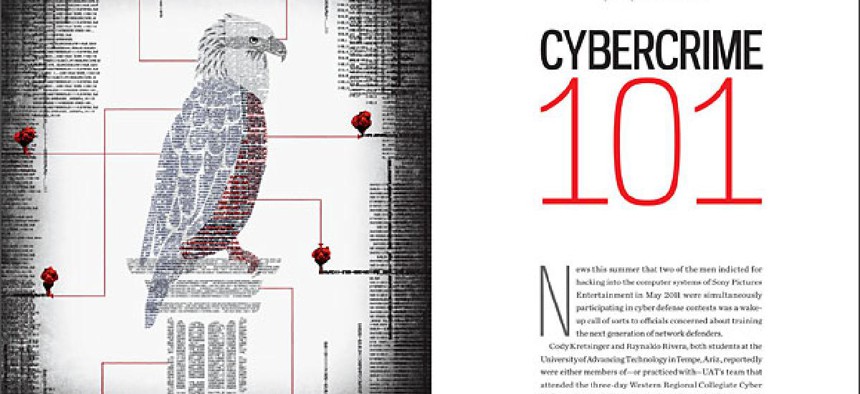
Anthony Tremmaglia
Cybercrime 101
The government wants to train network defenders to understand hackers, not emulate them.
News this summer that two of the men indicted for hacking into the computer systems of Sony Pictures Entertainment in May 2011 were simultaneously participating in cyber defense contests was a wake-up call of sorts to officials concerned about training the next generation of network defenders.
Cody Kretsinger and Raynaldo Rivera, both students at the University of Advancing Technology in Tempe, Ariz., reportedly
were either members of—or practiced with—UAT’s team that attended the three-day Western Regional Collegiate Cyber Defense Competition two months prior to the Sony attack. According to the FBI, they infiltrated Sony’s computers under the cover of hacktivist collective LulzSec.
Their activities suggest, to some, a need for young cyberwarriors to learn Cybercrime 101 at an early age.
Federal agencies need tens of thousands of computer whizzes educated in network protection and offensive techniques who are able to exploit flaws in an adversary’s networks, as well as detect weaknesses in the government’s own networks. To discourage trainees from becoming attackers themselves, some cybersecurity programs have set out to immunize kids against harmful hacking before they reach the fork in the road.
The Air Force Association’s Cyber-Patriot contest for high schoolers does not even teach ethical hacking or penetration testing. The first subject participants in the national cyber defense competition learn is cyber ethics and cyber citizenship, says CyberPatriot Commissioner Bernie Skoch, a former Air Force information technology director.
CyberPatriot, sponsored by the Northrop Grumman Foundation, aims to “strongly discourage” malicious activity by “explaining the legal consequences, the career consequences of someone in their adolescence doing the wrong thing,” he says.
The program is viewed as an inoculation against moral confusion, Skoch adds. “I liken what we’re doing to 4-H and to Girl Scouts of America and what we see in church groups across the nation,” he says. “We want to reach them very young so that when they confront a potential dilemma it’s not a dilemma at all.”
Skills passed on to youngsters include configuring network connections to stay shut when not in use so hackers can’t access files. And at the annual Cyber-Patriot finals in Washington, professionals from partner companies, such as SAIC, take the role of penetration testers, not the kids.
“We teach at an age-appropriate level,” Skoch says.
He acknowledges that teenagers coached on how to create strong passwords can infer from that how to take advantage of weak passwords. But anyone interested in password cracking can just as easily find how-to-hack manuals online, Skoch notes.
Some institutions that offer courses in potentially aggressive skills—think flight schools—screen applicants to weed out bad actors. But conducting criminal history investigations on the tens of thousands of students who enroll in each cyber competition may be overkill. “We don’t have a vetting process because we’re dealing with students as young as 13 years,” Skoch says. With as many as 10,000 competitors registering for CyberPatriot annually, “I don’t think it would be appropriate to do background checks.”
Ethical Hacking
During the past few years, many universities and nonprofits have sponsored school and professional contests that do teach ethical hacking. There is always the risk the cybersecurity scholars may be up to no good. But computer experts say one of the most important jobs in defending U.S. national security is detecting America’s network vulnerabilities.
For instance, some student quests in the U.S. Cyber Challenge “focus on a potentially vulnerable sample Web server as the artifact, challenging participants to identify its flaws using vulnerability analysis skills,” the program’s website states. The initiative is aimed at encouraging high school and college students “to fill the ranks of cybersecurity professionals.”
Cyber Challenge officials say they request professional references or teacher recommendations from high school and university students wanting to attend the program’s summer boot camps. They also question contestants on their ambitions, but do not go as far as inspections.
“We do not conduct background checks and I do not believe there are any questions that can truly screen malicious intentions,” says Cyber Challenge National Director Karen S. Evans, who held what is now the federal chief information officer position during the George W. Bush administration.
The competition provides students with legal information so they will use their talents appropriately, officials say. “We do include in our curriculum an ethics panel discussion with the campers, which includes panelists from the U.S. Secret Service and the FBI,” Evans says.
Meanwhile, the University of Maryland’s nationally recognized cyber-security center funds a cyber conference where high schoolers, college students and professionals “battle it out in a series of hackathons—exciting, real-world cybersecurity games that put their critical thinking skills to the ultimate test,” according to conference materials. Conference officials did not respond to a request for comment.
Obviously, players elsewhere have applied their critical thinking skills in real-world tests with more damaging results. InformationWeek’s Mathew J. Schwartz reported in late August that Kretsinger and Rivera—the men arrested in the Sony data breach—likely gained valuable experience through the March 2011 cyber defense match, in which contestants reportedly worked to disrupt and then restore network services to a fictional national “Security and Exchange Commission.”
In July 2011, Kretsinger “was named as student of the month [at UAT], saying, ‘a job with the [National Security Agency] or Department of Defense is my ultimate dream,’ ” Schwartz wrote.
NEXT STORY: Lifting the Lid







